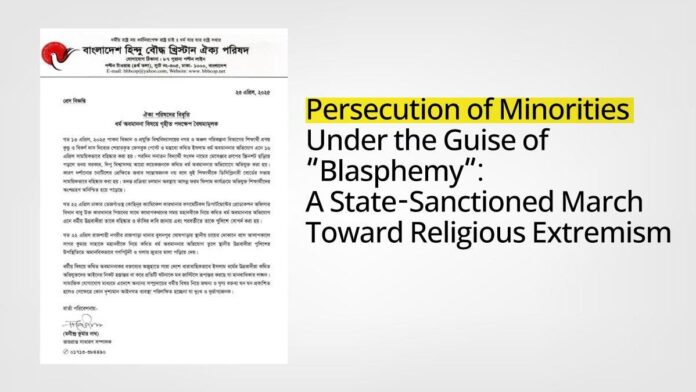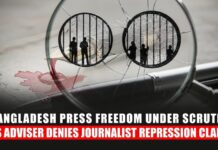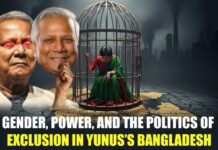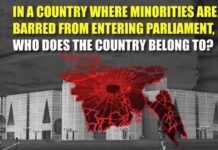
In Bangladesh, the targeted oppression of religious minorities has become a systematic, deliberate, and increasingly state-tolerated pattern. Accusations of “blasphemy” are now nothing more than convenient pretexts—used to deny minority communities their rights to education, employment, and even life itself. Under the cloak of religious sentiment, extrajudicial punishments, mob violence, job terminations, and state silence are pushing the country toward a suffocating reality of fear and injustice.
April 13, 2025: Pranoy Kundu and Bikarna Das Divya, students from the Urban and Regional Planning Department at Pabna University of Science and Technology, were temporarily suspended on April 16 for allegedly sharing a Facebook post and comment deemed “blasphemous.” Following the viral circulation of screenshots from a private student Messenger group (Sanatan Bidyarthi Sangshad), more students—like Tonoy Sarkar and Dipu Biswas—were implicated. Even before the investigation concluded, the university restricted their ability to complete essential academic formalities, revealing how access to education for minorities is now subject to conditional approval.
April 22, 2025: Bidhan Babu, a production officer at Kohinoor Chemical Factory in Tejgaon, Dhaka, was publicly humiliated by radicalized factory workers over accusations of blasphemy. Calls for his execution were raised before he was handed over to police—without investigation or legal process. Both factory management and state security officials remained silent spectators.
On the same day in Rajshahi’s Bulonpur Ghoshpara, a young man named Sagar Kumar Saha was brutally assaulted during a casual conversation at a tea stall. His alleged crime: making “disrespectful” remarks about the Prophet. In front of the police, he was beaten, garlanded with shoes, and publicly shamed. No one intervened. No one questioned it.
These are not isolated incidents. Today in Bangladesh, religious extremists are no longer treated as criminals; they are emboldened by state passivity—while minorities are cast as inherently suspect. Their speech, writing, and even private conversations are now potential “offenses,” solely due to their identity.
What’s more alarming is the blatant double standard. When similar hate speech or derogatory remarks about Islam come from members of the majority, the state remains mute. No arrests. No legal action. This hypocrisy is not just unconstitutional—it is the scaffolding of a fundamentalist state.
This is not new. Since August 5, 2024, there has been an alarming pattern of violence, land grabs, and government silence that makes clear: the existence of minorities in Bangladesh is under existential threat. At the heart of this orchestrated oppression is a corrupt and power-hungry leadership—posing as secular, while quietly handing minorities over to radical mobs.
And no name embodies this betrayal more than Muhammad Yunus. Under his interim regime, homes have burned, futures have shattered, and lives have been endangered—while he remains unmoved. He knows that the more fear is sown in the name of religion, the longer his illegitimate grip on power can endure.



